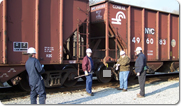Motive Power & Equipment Inspector
« Back to Employment home page

Duties: As a Motive Power and Equipment Inspector, you are responsible for the improvement and advancement of railroad safety in areas related to design, construction, inspection, maintenance and use of railroad rolling stock and related appurtenances within an assigned territory. In this capacity, you:
- Plan and carry out periodic inspections that provide assurance that railroad cars and locomotives are operational in compliance with Federal safety standards. The inspector is charged with the impartial and uniform application of the laws, rules, and regulations, orders and standards pertaining to railroad equipment.
- Inspect and observe tests of railroad rolling stock, including motive power, other on-track equipment, and related appurtenances to determine compliance with applicable laws, rules, regulations, orders and standards.
- Prior to or during assembly and installation, inspect and observe tests and component parts of railroad facilities to determine whether such parts are suitable for the intended service.
- Review existing and proposed motive power and equipment designs, construction, operations, maintenance and repair methods to ensure compliance with applicable laws, regulations, standards and orders.
- Make inspections and observations to determine the condition of motive power and other railroad equipment.
- Conduct investigations of collisions, reportable derailments, or other accidents resulting in serious injury to person(s) or to the property of a railroad. Determines probable cause of accident or incident and if Federal regulations were violated. Develops comprehensive reports which outline findings and recommendations.
Qualifications: To be qualified for a Motive Power and Equipment Inspector position, the Qualifications Standard state you MUST have demonstrated knowledge in the following areas:
- Design, maintenance, or inspection of various types of locomotive and freight cars currently in use and their capabilities and limitations.
- Federal laws and regulations pertaining to inspection and testing of locomotives, freight cars, safety appliances, or power brakes.
To qualify for the GS-12, you must have at least one full year of specialized experience equivalent to the work performed at the next lower grade level for this occupation:
- Inspecting various types of locomotive and freight cars, as well as railroad safety appliances and power brakes.
- Experience writing narrative reports that describe mechanical issues related non-compliance or safety concerns.
- Experience presenting information related mechanical issues to Federal, State, local government, or industry officials.
Physical Demands and Work Environment: The work requires long periods of walking over uneven surfaces around railroad train yards, repair tracks, accident sites and requires considerable bending, crouching, stretching and crawling in restricted areas to inspect railroad cars and locomotives and frequent climbing of ladders on cars, steps on locomotives and embankments around track roadbeds. Inspections of steam locomotives require considerable climbing and crawling in restricted areas inside boilers to make the required inspections.
A major part of the inspector’s time is spent inspecting freight cars and locomotives in large classification yards. Cars roll freely down an embankment or are flat switched onto tracks adjacent to the one being inspected. There is always danger of derailments that could cause cars to fall over. The inspector must be alert for wide loads and, if necessary, drop to the ground on the narrow walkways between tracks. He/she must also be alert to debris in the walkways between tracks to prevent tripping and falling into the path of moving equipment. The inspector is exposed to a variety of weather conditions and other environmental discomforts. In electrified territory, inspections are made around hi-voltage equipment. Inspectors are required to make inspections of cars in yards, plants and at derailment sites which are loaded with hazardous materials (poisonous, explosive, and highly flammable commodities).